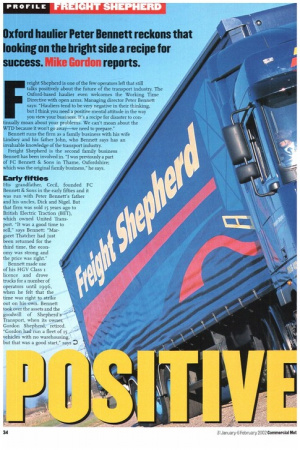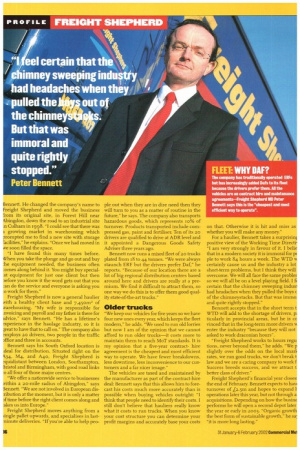Oxford haulier Peter Bennett reckons that looking on the bright side a recipe for
Page 34

Page 36

If you've noticed an error in this article please click here to report it so we can fix it.
success. ttuke tioruot reports.
Freight Shepherd is one of the few operators left that still talks positively about the future of the transport industry. The Oxford-based haulier even welcomes the Working Time Directive with open arms. Managing director Peter Bennett says: "Hauliers tend to be very negative in their thinking, but I think you need a positive mental attitude in the way you view your business. It's a recipe for disaster to continually moan about your problems. We can't moan about the WTD because it won't go away—we need to prepare."
Bennett runs the firm as a family business with his wife Lindsey and his father John, who Bennett says has an invaluable knowledge of the transport industry.
Freight Shepherd is the second family business Bennett has been involved in. "I was previously a part of FC Bennett & Sons in Thame, Oxfordshire; which was the original family business," he says.
Early fillies
His grandfather, Cecil, founded FC Bennett & Sons in the early fifties and it was run with Peter Bennett's father and his uncles, Dick and Nigel. But that firm was sold 15 years ago to British Electric Traction (BET), which owned United Transport. "It was a good time to sell," says Bennett: 'Mar garet Thatcher had just been returned for the third time, the economy was strong and the price was right," Bennett made use of his HGV Class 1 licence and drove trucks for a number of operators until 1996, when he felt that the time was right to strike out on his .own. Bennett took over the assets and the , goodwill of Shepherd's --''. Transport, when its owner, Gordon Shepherd, retired. "Gordon had run a fleet of 15 vehicles with no warehousing, but that was a good start," says Bennett. He changed the company's name to Freight Shepherd and moved the business From its original site, in Forest Hill near Abingdon, down the road to an industrial site Culham in 1998. "I could see that there was growing market in warehousing which prompted me to find a new site with storage Facilities," he explains. "Once we had moved in Are soon filled the space.
"I have found this many times before. When you take the plunge and go out and buy :he equipment needed, the business often mines along behind it. You might buy specialst equipment for just one client but then aefore you know it the word gets out that you :an do the service and everyone is asking you :o work for them."
Freight Shepherd is now a general haulier atith a healthy client base and 7,450m1 of Ararehousing. "My wife is responsible for rivoicing and payroll and my father is there for idvice," says Bennett. "He has a lifetime's ?.xperience in the haulage industry, so it is p-eat to have that to call on." The company also mploys zo drivers, two people in the traffic pffice and three in accounts.
Bennett says his South Oxford location is .deal for distribution. Situated right on the 434, M4, and A4o, Freight Shepherd is equidistant between London, Southampton, Bristol and Birmingham, with good road links :o all four of those major centres.
"We offer a nationwide service to businesses Nithin a zo-mile radius of Abingdon," says aennett. "We are not involved in European disTibution at the moment, but it is only a matter )f time before the right client comes along and -akes us into Europe."
Freight Shepherd moves anything from a 3ingle pallet upwards, and specialises in lastute deliveries. "If you're able to help peo
ple out when they are in dire need then they will turn to you as a matter of routine in the future," he says. The company also transports hazardous goods, which represents ro% of turnover. Products transported include compressed gas, paint and fertiliser. Ten of its 20 drivers are qualified to drive at ADR level and it appointed a Dangerous Goods Safety Adviser three years ago.
Bennett now rims a mixed fleet 0120 trucks plated from i8 to 44 tonnes. "We were always staunch ERF but the drivers prefer Daf," he reports. "Because of our location there are a lot of big regional distribution centres based around here and drivers are really at a premium. We find it difficult to attract them, so one way we do this is to offer them good quality state-of-the-art trucks."
Older trucks "We keep our vehicles for five years so we have four new ones every year, which keeps the fleet modern," he adds. "We used to run old lorries but now I am of the opinion that we cannot afford to run older trucks—it costs more to maintain them to reach MoT standards. It is my opinion that a five-year contracthire agreement is the cheapest and most efficient way to operate. We have fewer breakdowns, less downtime, less inconvenience to our customers and a far nicer image."
The vehicles are taxed and maintained by the manufacturer as part of the contract-hire deal: Bennett says that this allows him to forecast his costs much more accurately than is possible when buying vehicles outright: "I think that people need to identify their costs. I still don't believe that hauliers really know what it costs to run trucks. When you know your cost structure you can determine your profit margins and accurately base your costs on that. Otherwise it is hit and miss as whether you will make any money."
For a haulier, Bennett takes a surprisini positive view of the Working Time Directi, "I am very strongly in favour of it. I belie that in a modem society it is immoral for p( ple to work 84 hours a week. The WTD certainly cause us and the industry a lot short-term problems, but I think they will overcome. We will all face the same probler so we will an be on a level playing field. I f( certain that the chimney sweeping indusi had headaches when they pulled the boys c of the chimneystacks. But that was immo: and quite rightly stopped."
Bennett accepts that in the short term t WTD will add to the shortage of drivers, pi ticularly in provincial areas, but he is cc vinced that in the long-term more drivers in enter the industry "because they will not asked to work draconian hours".
"Freight Shepherd works to hours regu tions, never beyond them," he adds. "We p slightly over the odds on the local marl rates, we run good trucks, we don't break t law and we are a caring company to work Success breeds success, and we attract f better class of driver."
Freight Shepherd's financial year closes the end of February. Bennett expects to havi turnover of L2.5m and hopes to expand 1 operations later this year, but not through a acquisitions. Depending on how the businE performs he will open a second depot later the year or early in 2003. "Organic growth the best form of sustainable growth," he sa: "it is more long lasting."
















































































































































